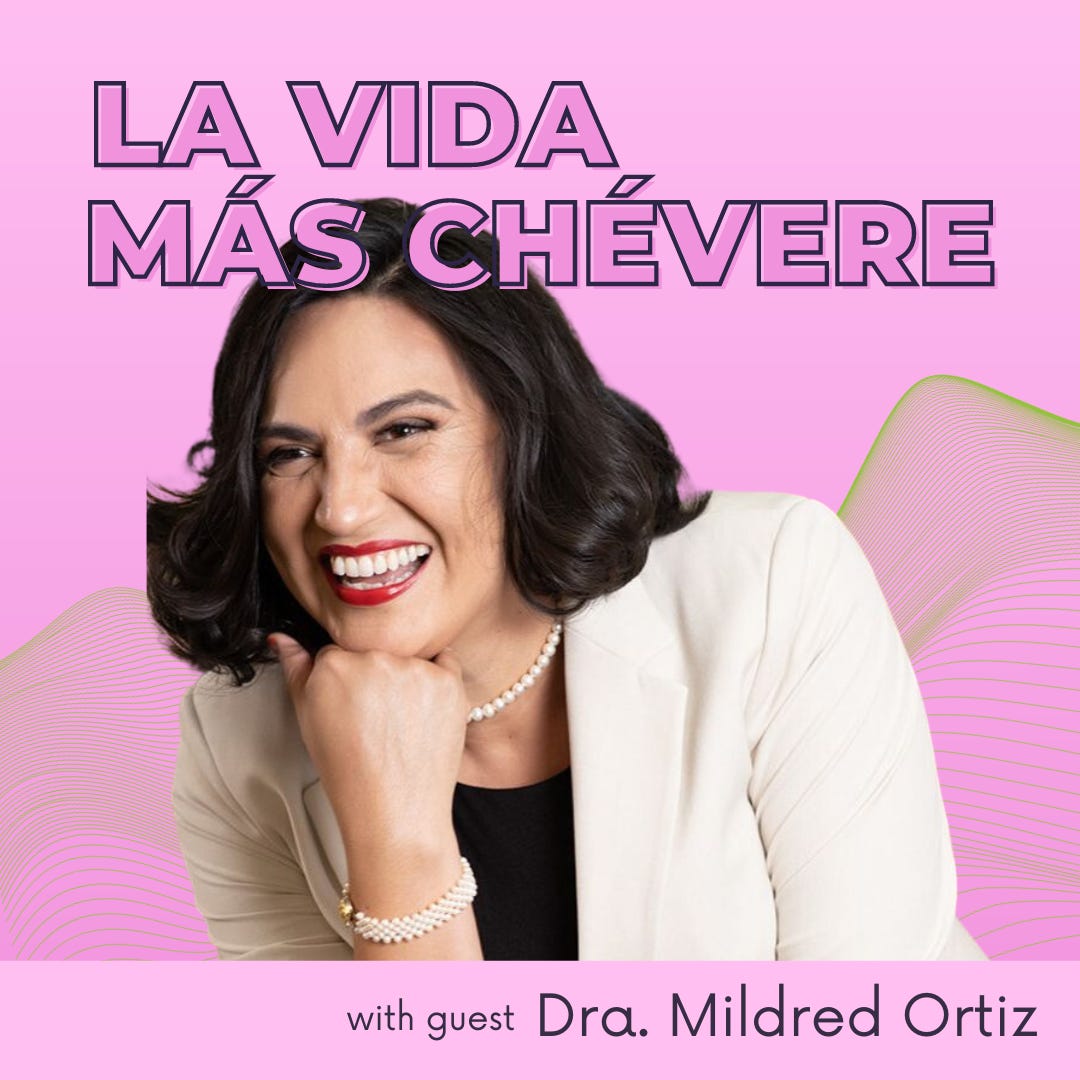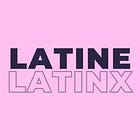Creating a Latine-Focused Therapy Practice
Doctora Mildred Ortiz's journey from therapist to business owner
Want to get right to this week’s podcast episode? Check out the full transcript, show notes, and your favorite podcast app for Latines Embracing Mental Health: Shattering Therapy Taboos with Dra. Mildred Ortiz or scroll down for the Apple, Spotify, and YouTube players.
There are people who actually say, out loud and proudly even, that they don’t believe in therapy. Maybe they’ve had bad experiences. Maybe they’re afraid of what therapy will help them uncover. Maybe they’re not ready to face their inner demons (or heal their inner child).
Whatever the reasons for this kind of statement, the truth is: we can all use therapy. Even if we think we’re each the most well-adjusted human being on the planet (maybe take a listen to this episode), we are all subjects of The Patriarchy. Which means we are therefore living in a fucked up society in which we’re constantly exposed to toxic traditions and cultural norms. So even if there’s nothing “wrong” with you, there’s plenty wrong with the world.
So the toxic tradition/cultural norm we’re dismantling in this interview is our attitude towards therapy. There’s a giant stigma in Latinidad (and many other cultures) against airing our dirty laundry. Our people won’t seek mental health help for numerous reasons including cost, language barriers, and availability.
And another reason: they see it as a sign of weakness.
Every bit of that is a toxic idea. Not treating mental health problems only serves to perpetuate cycles of generational trauma yet each of us has the ability to stop that cycle in our own lives right here. Even if we’re not going to pass on the trauma to a child, we still owe it ourselves to heal those parts affected by this society.
That's the reason you listen to this podcast and read this newsletter, no? For help dismantling the toxic cultural bullshit. Because as I stated above, by simply existing in our culture, you are being shaped and taught to accept a lot of bullshit that isn’t healthy.
In this interview, I'll reveal my own experiences with therapy, both for myself and with my husband. And you'll hear me explain why I highly recommend it to everyone, especially if you're considering marriage. So let me tell you about today's guest, a Latina therapist I met back in Los Angeles. Her longer bio can be found in the extended show notes, but here are some highlights:
Doctora Mildred Ortiz is a clinical psychologist licensed in the state of California. She's a native to Los Angeles and a child of immigrants. She's worked in the mental health field for nearly 20 years and has provided clinical support and guidance to patients of different walks of life, experiences, cultures, and traditions, including monolingual Spanish speakers.
She's provided therapeutic support to individuals feeling troubled by recent life transitions. Grief and loss and relationships involving intimacy and communication. She strives to help clients create healthy boundaries for themselves while taking great care in exploring, identifying, and preserving cultural and traditional value systems within their relationships.
In these next sets of essays, you’ll learn:
About Dra. Ortiz’s journey from solo therapist to becoming the head of her thriving practice
How to shop for a therapist and what questions to ask to find the right one for you
How to successfully end therapy (or break up with someone if it isn’t working)
What follows is Part 1 of the condensed version of our conversation.
Founding a Latina-led Corporation
Paulette: Talk to us, Doctora Ortiz, about what it is like to own your own practice, because you're a psychologist or a psychotherapist?
Mildred: I am a psychologist. It's interchangeable. That's anyone who provides psychotherapy, no matter what their title is.
It's really nice! I love being a business owner, and that was not always the case. So, being the owner of Buena Vibra Psychological Services, we're still in our infancy. We are turning one in August.
Paulette: Congratulations!
Mildred: Yes, and we are really excited about it. Prior to this, I was working as a solo provider, just under my name. And it [was] just myself and I was happy with that.
And then COVID happened and there was an influx of people just interested, wanting, needing the services. And a lot of people that hablan español (translation: speak Spanish), wanting services en español (translation: in Spanish). Or at least someone who understands it and who they can speak Spanglish with.
And then I realized I can't duplicate myself. There's not enough hours in the day for me to realistically be able to accommodate everyone that is calling me.
And that is how Buena Vibra was born. And it's been a journey, so far. Huge learning curve, and I'm still learning. Definitely a lot of insecurities along the way, lots of lessons learned. I like using that term over failures. Lots of highs and lows and learning to be a leader. Because even with that, my plan was just to hire one other person [but] so now we've grown to four!
Paulette: Oh, wow.
Mildred: Yeah, I don't know that I would have foreseen this a year ago when I formed the corporation.
Paulette: Buena Vibra is an LA-based practice, correct?
Mildred: Correct.
Paulette: You and I met at Latina Fest in March earlier this year, and you were at the first table. What I was really excited about in talking with you [is] your energy is great. You were very easy to talk to, which I think is very important in your profession. Somebody who is trustworthy.
And when I relaunched this podcast, I was talking about self-care we could do for ourselves.
And part of that is looking for support in one's life. The self-care that you can offer might also look like mental health care, but that it's important to have mental health care providers who look like us, who understand the nuances of our culture and who speak the language, whether it be Spanish or English or Spanglish.
And so you were the first vendor I saw, and I was so excited because you were all of those things. And then I start telling you about the podcast, you start telling me about your podcast and I'm like, we need to work together. So it's very exciting what you're doing and the service you're providing. And clearly there is a need for brown therapists.
Mildred: Oh my gosh, such a need! And I've known all along.
So I've been working in the mental health field for nearly 20 years at this point. And went into private practice in 2016. Prior to that, I worked in community mental health and, and also worked for the county of LA, which is obviously different than the private sector because now we're talking about the underserved communities.
There's a lot of people of color that are being served in community mental health that are being served by the county of LA. And the majority of the people that I worked with looked like me, or shades of me. So when I went into the private practice sector, I noticed that there was a huge shift at that particular time.
Still, there weren't a lot of people that looked like me that spoke the language. And when I'm referring to private sector, I'm referring to people who have private insurance. So the HMOs and the PPOs, as well as those that are willing and able to pay out of pocket.
So it was a very different demographic.
I was established from the very beginning in LA County; Cerritos, California, to be exact. What I started noticing was that my name alone…now my name is interesting because it's Mildred, which is a very old school American name. But my last name is Ortiz, so just the last name alone just got my phone ringing.
“Do you speak Spanish?”
And I had a website too, so people are Googling, and they see that, oh! There's a page on her website that is all in Spanish. And and at that time, that's all that I had, was a website, I had my name on a directory.
So I was centrally located where people were willing to drive out to Cerritos to come meet with me in person and access the services. You are absolutely right when you are saying that people are looking for therapists that look like them, can speak the language, who at the very least can understand.
Because, for most of us, we live in homes where we speak variations of Spanish and English. And if our parents don't speak English, then my clients are coming in and they're talking to me and they're talking to me in Spanish about what their parents would be saying to them. And then they're like, “do you understand?”
Of course. Yes.
And then the influx of that during and after COVID, now post COVID.
Paulette: So you started Buena Vibra a year ago, and prior to that, you were in private practice for how long?
Mildred: We can say 2015. I started off with a friend, colleague, peer of mine, can I do a shout out to Dr. TK? She's huge on Instagram.
She had been pushing for me [to] come to private practice. “Come, I'll help you and, and, and we'll do this together.” She had a group practice at that time. So I started off with her.
And then in 2016 is when I jumped into it on my own. That was her plan all along, let’s get you established. So I've been in private practice since 2015, on my own since 2016. And yes, Buena Vibra formed in 2022.
Paulette: That's a journey.
And it's really great to hear that you are inundated with patients, not because our people need the help, but because they're seeking the help. I think that is so healthy and I'm very excited to hear that!
And clearly the need is there and whatever stigma might exist in Latinidad around airing your dirty laundry or seeking help, those generational boundaries or whatever are being dismissed in favor of getting the necessary help. I'm so happy to hear that. That's a very good trend!
Stay tuned for more of this conversation coming next week!
Get this episode in your earholes on any podcast platform or listen to it on Apple
Listen on Spotify






